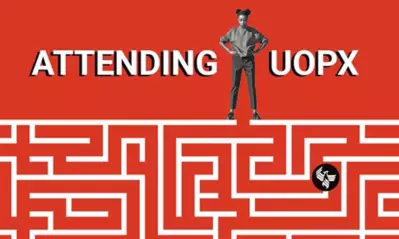How individual online college courses can help you graduate

Written by Elizabeth Exline

So close, yet so far away
Rare is the major accomplishment that can be completed quickly. From art and architecture to software development to, yes, even a four-year degree, doing big things usually takes time. In the case of degrees, it also takes discipline, aptitude and, sometimes, a little creativity.
Consider, for example, any of the following situations:
- A failed class
- A prerequisite class that you can’t get into
- A required course you anticipate being challenging (and would like to spend extra time and attention on)
Any of these situations (and certainly a few others) can be remedied by taking individual online courses at an accredited institution like University of Phoenix (UOPX) and then transferring those credits to the college where you’re earning your degree.
Chantel Hansen, MSA, has seen this play out numerous times during her 15-year tenure with UOPX. “Non-degree students enroll in those classes to transfer to their other colleges so they can graduate on time and stay on track,” the enrollment manager explains. “We’ve had so many students who are like, ‘Oh, I thought I was graduating, and then they told me I was a class short … or I didn’t pass this math class or meet a certain requirement.’ We’ve really been able to step in and fill [that need] for a lot of people.”
The (many) cases for individual courses
As Hansen notes, plenty of students come to UOPX in search of those one or two classes they need to graduate or to meet eligibility requirements for a graduate program.
That’s not to say some due diligence isn’t required. Students should verify before they enroll that a course’s credits will transfer to their college. (That’s something Hansen and her team can help prospective students navigate.) But the following categories are ones where Hansen has seen UOPX be particularly helpful.
General education requirements and program prerequisites
All fields of study are not the same, but very often general education is. Students looking to make up a missing or failed gen-ed class or to get a program-specific class out of the way, can often find what they need (and quickly!) at UOPX.
Online courses are available in the following academic areas:
- Science (with and without labs)
- English
- Math
- Humanities
- Business and accounting
- Social sciences
- Communication
You don’t have to be behind schedule to benefit either. Individual courses can be a helpful option to those looking to jump-start their degree program too. Students can, for example, knock out a few gen-ed requirements during the summer or in between semesters. (Although the latter may involve some overlap with their regular class schedule.)
Individual online courses are also a nice way to tackle particularly challenging subjects. If you know a certain class will be hard for you, it might be wise to take it during the summer when you can focus on it without juggling four other classes at the same time.
The professionals
While individual online courses can be mission-critical for undergraduate students looking to complete their degrees, individual classes can also benefit working professionals. Teachers, for example, often need continuing education to recertify their licenses or pursue professional growth.
“Often teachers are like, ‘I need this now,” or, ‘This job just came up, and I have to have the credit.’ So, they’re in a time crunch,” Hansen says.
UOPX answers that call in a variety of ways. Teacher education courses are just 4 to 6 weeks but provide graduate semester credits in such subjects as teaching strategies, adult education, special education and educational technology.
Accountants looking to earn their CPA licensure are another group who often seek out UOPX classes. While the University does not facilitate CPA exams or provide licensure, it does offer accounting online courses that can help prepare students to sit for the CPA exam.
Healthcare workers in need of science prerequisites like biology courses also come to UOPX. Even though the University doesn’t offer a dedicated biology or chemistry degree, it does have a variety of science online courses in those disciplines. Anatomy and physiology, chemistry, microbiology — even invertebrate zoology — are all available at UOPX.
Hansen has seen her fair share of students from all these backgrounds and more come through UOPX in search of a speedy solution to their degree conundrums. “Our online courses run so frequently, people’s goals are usually met,” Hansen explains. “We can look at what’s available in someone’s time frame, and [the student] can take that back to their school and make sure they’re approved.”
How to transfer credits to college
Getting that approval is a key part of any transfer credit , whether it’s three credits from an individual course or an associate degree you’d like to parlay into a bachelor’s degree.
Enrollment advisors like Hansen can be helpful during this process. They can provide the syllabus or course design guide that another school may require in order to grant approval for the credits to transfer.
“Accreditation [of the school] is key and helps ensure confidence that the coursework will transfer,” Hansen adds. It’s not a guarantee, but it’s a good reminder to students seeking spare credits that not all university credits are created equal.
The value of transfer credits
So, how effective are individual courses in the overall scheme of things? According to the numbers, pretty effective. In 2021, more than 13,000 non-degree students took more than 21,800 courses at UOPX.
Considering the value UOPX offers non-degree students, the popularity of individual courses makes sense. The University offers competitive rates.
Then there’s the online format, which is not only convenient for students who are working or attending school elsewhere, but also makes it easier for some students to learn. In certain courses, you can pause or re-watch content that’s confusing or challenging, Hansen notes. (This explains why those physiology classes and science labs are so popular.)
In the end, individual courses offer the flexibility and affordability that make it a little bit easier to accomplish something great.

ABOUT THE AUTHOR
Elizabeth Exline has been telling stories ever since she won a writing contest in third grade. She's covered design and architecture, travel, lifestyle content and a host of other topics for national, regional, local and brand publications. Additionally, she's worked in content development for Marriott International and manuscript development for a variety of authors.
This article has been vetted by University of Phoenix's editorial advisory committee.
Read more about our editorial process.
Read more articles like this:


